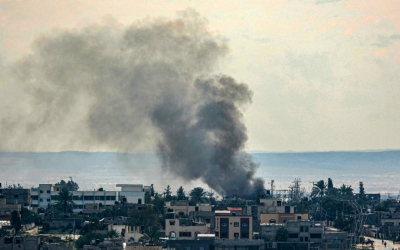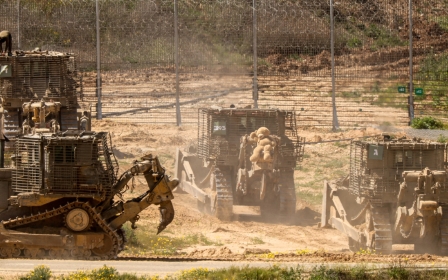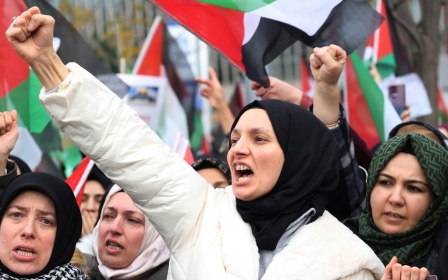War on Gaza: Can Egypt stop Israel from invading Rafah?

Top Israeli and Egyptian military and intelligence officials reportedly met in Cairo last month to discuss the looming ground invasion of Rafah and a possible truce and hostage deal to end the war on Gaza. This comes amid concerns in Cairo that a full-scale Israeli assault on Rafah could lead to a massive refugee influx across the Egyptian border.
Soon afterwards, an Egyptian delegation reportedly visited Tel Aviv to discuss the potential deal with representatives from the Shin Bet, the Israeli army and Mossad.
At the same time, the Egyptian newspaper Al-Shorouk published a statement attributed to an Egyptian source, who said that any invasion of Rafah would violate the Israel-Egypt peace treaty and receive a decisive response from Cairo.
US and Israeli media reported that during the recent discussions, the Egyptian side indicated its determination to pressure Hamas to reach an agreement for the release of hostages. During the second meeting, according to Israeli media, Israeli officials informed the Egyptian delegation that this was the “last chance” to reach an agreement before it went ahead with the Rafah invasion.
Prior to these discussions, Egypt had tried through various means to reject the displacement of Palestinians into the Sinai. Mass displacement has been the primary concern for the Egyptian regime, overshadowing other humanitarian, military and security issues.
New MEE newsletter: Jerusalem Dispatch
Sign up to get the latest insights and analysis on Israel-Palestine, alongside Turkey Unpacked and other MEE newsletters
Rafah houses more than a million people, including residents and those displaced from other areas of Gaza, so an invasion could send tens of thousands of Palestinians towards Egyptian territory. Egypt has repeatedly and publicly rejected such a prospect.
Meanwhile, Israel has reportedly drawn up an evacuation plan for residents trapped in Rafah, including thousands of tents for relocation - but such plans are impractical in the face of the huge numbers of people who would be affected. In addition, some Palestinians who have attempted to return to the north have changed course in the face of Israeli massacres and mass graves.
Nightmare for stability
With its options seemingly exhausted, Cairo’s only remaining course of action to prevent the Rafah operation has been to push for a prisoner exchange deal, aiming to prevent or delay the invasion for as long as possible, while hoping the balance of power may shift in Tel Aviv or Washington.
At the same time, Cairo is preparing for the possibility that Israel will move ahead with the Rafah invasion - and for the consequent mass displacement of Palestinians. Contingency plans are being drawn up, such as providing camps that can be controlled and monitored, intensifying the local security presence and ensuring full control over the entrances and exits into northern Sinai.
In short, Cairo sees the Rafah invasion as a nightmare for its security and future stability.
Follow Middle East Eye's live coverage of the Israel-Palestine war
The Egyptian and Palestinian cities on either side of the border share the same name, Rafah, and this is no coincidence; historically, it was one city, but it was divided into two after Israel’s withdrawal from the Sinai and the demarcation of borders in 1982.
Even after the international border divided them, families, clans and tribes remained in constant communication. Many families are still physically divided, with some members in Egyptian Rafah and others in Palestinian Rafah.
All of these factors are ramping up pressure on Cairo to prevent the Israeli ground invasion of Rafah, or at least buy more time
This demographic factor poses a significant security challenge, as any Palestinian displacement towards Egyptian territory would not only resettle Palestinians, but also serve as a base for resistance against Israel.
This time is different from previous instances when Palestinians fled to the Sinai in 2005 and 2008, only to return to the Gaza Strip. There’s nothing for them to return to now, as Israel has destroyed vast swathes of the land they once inhabited. This could push thousands of displaced individuals to consider taking up arms against Israel.
For the past decade, the Egyptian army has battled against armed fighters targeting the military, the state and civilians. But in a scenario where armed factions are targeting Israel, any intervention by the Egyptian army would be seen as protecting Israel’s security, thus weakening its own legitimacy.
Escalating tensions
On the other hand, if resistance operations against Israel were to originate from Egyptian territory, then Israel would have justification to target Egypt directly. Egypt might not have the luxury of remaining silent and non-responsive in such a situation. Yet, it also does not want to engage in a confrontation that could escalate tensions with Israel and its US backers.
For more than four decades, since the signing of the Camp David Accords, security and military coordination between Egypt and Israel has formed the basis of their relationship with the US. Some even argue that Israel’s importance to Egypt is akin to the importance of Gulf oil to Washington.
Through this relationship, successive Egyptian regimes have garnered tens of billions of dollars in aid, as well as political and international support to navigate through many crises. This framework has served as a strong bulwark for Egyptian dictatorships against popular demands.
Israel has worked hard to maintain and stabilise this equation. But it is all on the line now as Tel Aviv, under the leadership of Prime Minister Benjamin Netanyahu, faces an unprecedented situation. Netanyahu is willing to risk everything to save himself from an inevitable fate tied to the end of the war on Gaza, even if it means tearing up the peace treaty with Egypt.
Rafah has become the only way to continue the war after Israel’s plans for regional escalation via Iran failed. Meanwhile, Netanyahu has shown in recent months that his influence over Washington is stronger than previously understood, making matters even more difficult for Cairo.
Since 7 October, the Egyptian regime has been trying to peacefully resolve the Gaza crisis, which has sparked domestic anger and protests that have also put the regime in their crosshairs, leading to a crackdown on demonstrations. The Egyptian people have found few outlets to support Palestinians in Gaza, other than donations, blogging and praying.
The situation will become even more difficult if the Sinai becomes a launchpad for operations against Israel. All of these factors are ramping up pressure on Cairo to prevent the Israeli ground invasion of Rafah, or at least buy more time.
The views expressed in this article belong to the author and do not necessarily reflect the editorial policy of Middle East Eye.
Middle East Eye delivers independent and unrivalled coverage and analysis of the Middle East, North Africa and beyond. To learn more about republishing this content and the associated fees, please fill out this form. More about MEE can be found here.






